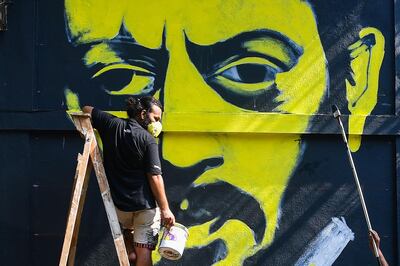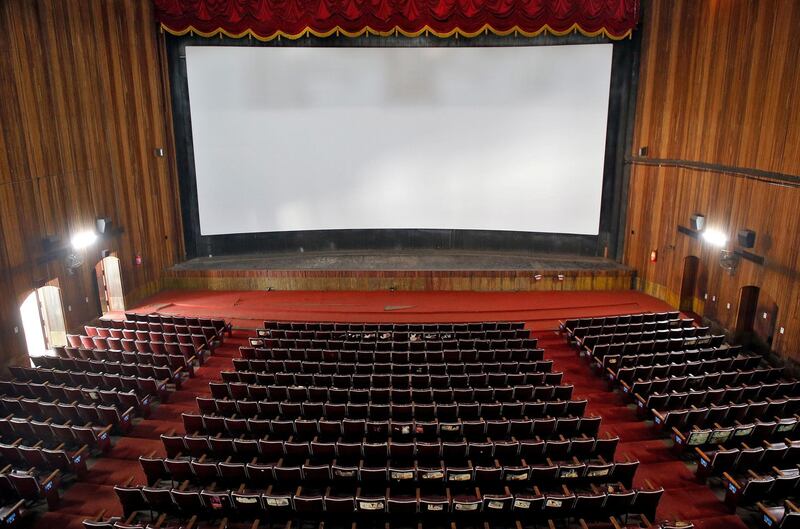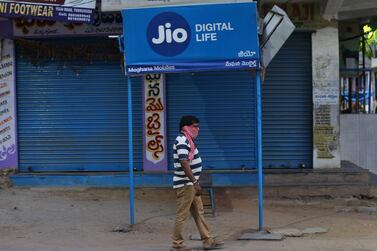Bollywood, the world's largest film industry, has been hit hard by the coronavirus pandemic, and industry insiders fear it could face a long road to recovery.
Production on films has largely stopped amid a nationwide lockdown, and cinemas are shut across the country as the number of Covid-19 cases in India continues to rise.
“The film industry has taken a huge hit and the process to normalisation looks to be slow,” says Siddharth Anand Kumar, the vice president, films and events, at Saregama, an Indian entertainment company. “It's worrying because our business depends on audiences entering theatres and that in turn depends on us producing films.”
Film sector revenues in India totalled 183 billion rupees (Dh8.9bn) in the financial year to the end of March 2019, according to KPMG. It is an industry that normally produces as many as 2,000 films a year.
But now, box office revenues have completely dried up and projects are being delayed, which means huge losses.
Data on Statista.com shows that about 250,000 people are employed in the film industry in India – but in addition, there are hundreds of thousands of contract and temporary jobs in the sector.
“Everything is on pause,” says Deepshikha Deshmukh, a non-executive director at production company Pooja Entertainment. "It's worrying because there will not just be a delay for projects ready for release, but all the others that are midway or nearing completion. I worry for the daily wage workers and technicians.”
On Friday, the India government announced that the nationwide lockdown would be extended for another two weeks until May 17.
That was another blow to Bollywood, which lost two of its best-loved stars to cancer last week: Irrfan Khan and Rishi Kapoor.
With everyone largely confined to their homes, production of films is limited to working on scripts and discussing plans over video conference apps.

“We realise that things won't become 'normal' overnight so we are planning for measures to be taken post-lockdown,” says Mr Kumar. “New shooting guidelines are being formulated. A large number of our films are up for release so we are revising strategies of release, given how things will turn out to be in the foreseeable future.”
Bollywood films that have been impacted by the coronavirus pandemic include Radhe: Your Most Wanted Bhai. This action movie, starring one of Bollywood's biggest actors, Salman Khan, was due to be released during Eid, and was almost certain to do well at the box office. But filming had to stop because of the virus. It has become a tradition for Salman Khan to release a movie for Eid – something that has happened without fail over the past decade. Last year's film, Bharat, which was partly shot in Abu Dhabi, earned more than 3.2 billion rupees at the box office.
“Everybody is losing money on a daily basis, so it's a very difficult time for the entertainment industry,” says actress Pavleen Gujral. “It's a huge loss and a huge setback and I hope that the industry recovers from it soon.”
On the brighter side, she adds that it is a “good time to work on your craft” and that screenwriters are able to continue to write new content.
Mumbai, which is the home of Bollywood, has the highest number of confirmed Covid-19 cases of any city in India.
Bollywood's Nitin Arora, like many actors, is being very active on social media during the lockdown, posting live chat sessions with other names from the industry on Instagram to reach out to his fans.
Entertainment, he says, “is going through its worst phase ever” and that “if things don't change in the coming three to four months, then it's going to get even worse. But we are crossing our fingers and hoping things will get better.”
He explains that innovation is key, including moving on to digital platforms.
Filmmaker and producer Radhika Lavu says that her discussions are currently focused on how the industry will adapt once the lockdown is lifted, given that shoots will need to have far fewer people on set.
“The bigger projects, the discussions are still on and we're still talking about it,” she says. “I'm hungry to get back in.”
KPMG, in a report released in April on the entertainment sector in India, explains that for the film industry, “the recovery here might take longer than anticipated”, with many people likely to be wary of going to the cinema for some time, even after they reopen.
“Certain sections of consumers – particularly those residing in Covid-19 hotspots, for example – are likely to remain apprehensive of crowds and display a preference for at-home media and entertainment options,” KPMG says.
The report explains that television viewership has grown during the lockdown period and says that the “silver lining” for the entertainment sector is OTT viewing, which refers to content viewed online on streaming platforms. Popular platforms in India include Netflix, Amazon Prime and Hotstar.
A report by the Broadcast Audience Research Council last month revealed that television consumption in India is up about 40 per cent compared to the period before the coronavirus pandemic disrupted daily life.
The OTT market was already growing rapidly in India amid an increase in the number of Indians accessing the internet, largely via smartphones.
“We've seen big growth in viewing in India and have had great success on our local originals there as well,” said Ted Sarandos, the chief content officer at Netflix on the company's latest earnings call on April 21.
But even this sector will face challenges given that content is not being produced.
“The content pipeline has dried up, and OTT players with a large, legacy library have an advantage,” according to KPMG. “Ad spends are currently down but greater digital allocations by brands is likely post-recovery.”
Once filming is possible again, many expect that there is likely to be more of a focus on churning out OTT content, given the uncertainty surrounding viewership at cinemas.
“It may take years for theatrical to make a comeback,” says Rahsaan Noor, a US-based actor and filmmaker who is currently in Mumbai, shooting a show with industry experts which looks at how the industry will change post-lockdown.
“As filmmakers, we're concerned about how we can actually produce our films. Once the cases die down and social distancing begins to ease, how can we bring people together in a safe and responsible way in order to bring our stories to life?”
He says that “it seems like OTT is the only way forward at the moment” and that India could see a situation where it “will see a further loss of cinema halls”. The country already had a limited number of cinema screens considering the size of its population.
But he adds that there is also “an opportunity, forcing a creative industry to become more creative”.
“While the lockdown persists, the time has come to chart out a plan post-lockdown,” says Indian film producer Anand Pandit. “For us to come out of the situation created by the pandemic, the big players in the industry will have to come together and chart out a course that has the support of all,” Mr Pandit says.
Ms Lavu is optimistic that the film industry will bounce back and Indians will eventually flock to cinemas again.
“Going to movies is part of the Indian social fabric,” she says. “We love going out and watching movies. The theatre experience is very different from watching on mobile phones or televisions.”







